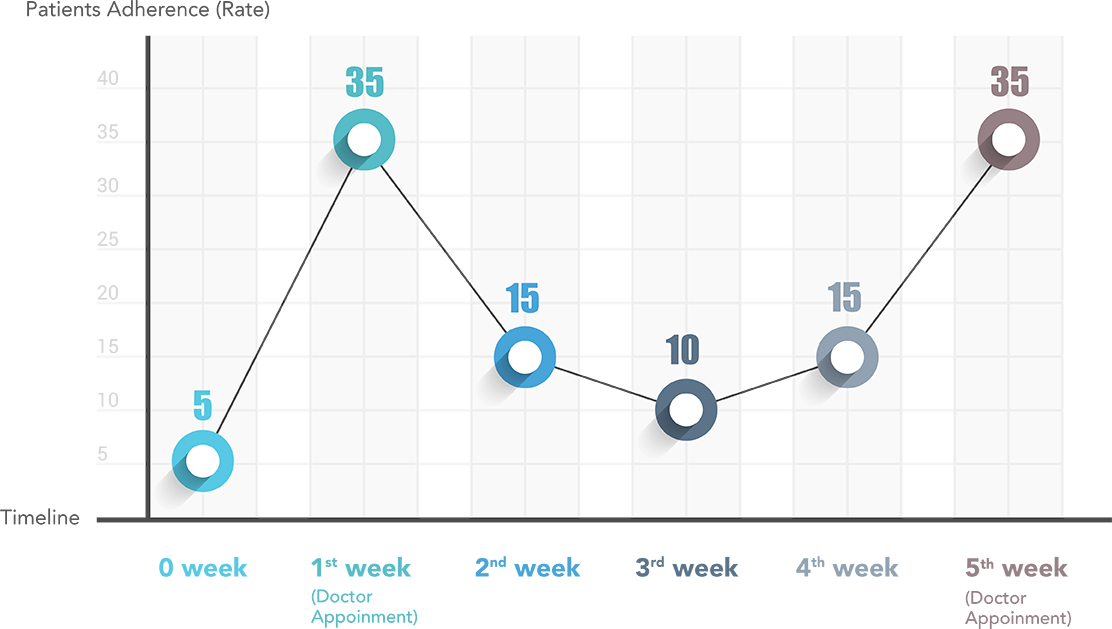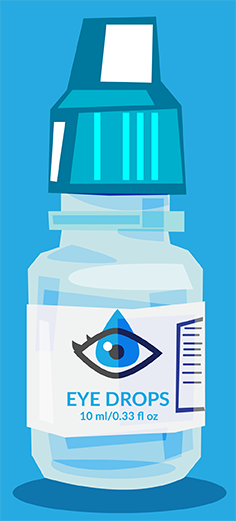Importance of self-discipline
in glaucoma treatment
According to the World Health Organization (WHO), glaucoma is the world's second leading cause of irreversible blindness that can be prevented with timely and effective treatment.10

Importance of self-discipline
in glaucoma treatment
According to the World Health Organization (WHO), glaucoma is the world's second leading cause of irreversible blindness that can be prevented with timely and effective treatment.10

Prescription eye drops
Prescription eye drops, for example, are effective in preventing the progress of glaucoma but unfortunately, research has shown that about 40% of patients do not take or even continue with their medications as prescribed.11
Failure to take your medication regularly, consistently and properly as prescribed will result in ineffective treatment12 and will cause further damage to your eyes.11
White-coat adherence is common, in which patient adherence rises sharply 1 week before the appointment with the physician, then declines rapidly following the appointment.

Above image is a just a graphical representation for reference 2.
White-coat adherence may make it difficult to assess IOP control over the longer term;
cycling behavior with medication use is well-documented.2
A disciplined approach in following the treatment plan by the patient is
therefore extremely critical to help prevent glaucoma progression that,
as we know, can lead to blindness.
Medication-taking behaviour 12
As we are aware, glaucoma usually does not have any symptoms4 until the late stages and this causes many people with glaucoma to not notice that they have the disease. Glaucoma being asymptomatic also causes patients to not realise that their condition is worsening and not understanding the importance of proper medication-taking behaviour as the damage is not immediately noticeable.
Patients must be reminded that by the time visual impairment sets in, it may be too late to stop the damage so treatment has to start early and correct medication-taking behaviour must be maintained properly.

Three main elements that are important in a patient's medication-taking behaviour are:-

Compliance
Yes, I am taking my medication.
Persistence
Yes, I have been taking my medication for the past 6 months as prescribed.
Adherence
Yes, I am taking my medication as prescribed, the correct number of drops in the correct eye, at the correct time of the day.
A team effort
It is clear to see that glaucoma treatment is a team effort where the patient has an important role to play in following the treatment plan by having the appropriate medication-taking behaviour as much as the doctor who is prescribing the medication and managing the treatment plan for the disease.
Please discuss with your doctor if you have issues that may result in you having any unfavourable medicine-taking or experiences in order for your doctor to have the proper detailed information required to provide you with the most effective treatment plan.
Learn more Watch Video
Prescription eye drops
Prescription eye drops, for example, are effective in preventing the progress of glaucoma but unfortunately, research has shown that about 40% of patients do not take or even continue with their medications as prescribed.11
Failure to take your medication regularly, consistently and properly as prescribed will result in ineffective treatment12 and will cause further damage to your eyes.11
White-coat adherence is common, in which patient adherence rises sharply 1 week before the appointment with the physician, then declines rapidly following the appointment.

Above image is a just a graphical representation for reference 2.
White-coat adherence may make it difficult to assess IOP control over the longer term;
cycling behavior with medication use is well-documented.2
A disciplined approach in following the treatment plan by the patient is therefore extremely critical to help prevent glaucoma progression that, as we know, can lead to blindness.
Medication-taking behaviour12
As we are aware, glaucoma usually does not have any symptoms4 until the late stages and this causes many people with glaucoma to not notice that they have the disease. Glaucoma being asymptomatic also causes patients to not realise that their condition is worsening and not understanding the importance of proper medication-taking behaviour as the damage is not immediately noticeable.
Patients must be reminded that by the time visual impairment sets in, it may be too late to stop the damage so treatment has to start early and correct medication-taking behaviour must be maintained properly.

Three main elements that are important in a patient's medication-taking behaviour are:-
Compliance
Yes, I am taking my medication.
Persistence
Yes, I have been taking my medication for the past 6 months as prescribed.
Adherence
Yes, I am taking my medication as prescribed, the correct number of drops in the correct eye, at the correct time of the day.


A team effort
It is clear to see that glaucoma treatment is a team effort where the patient has an important role to play in following the treatment plan by having the appropriate medication-taking behaviour as much as the doctor who is prescribing the medication and managing the treatment plan for the disease.
Please discuss with your doctor if you have issues that may result in you having any unfavourable medicine-taking or experiences in order for your doctor to have the proper detailed information required to provide you with the most effective treatment plan.
Learn more Watch Video